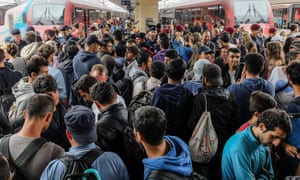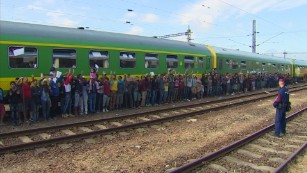
Under a cold rain, waves of exhausted migrants late Saturday continued to pour into the border town of Nickelsdorf, in Austria's Burgenland state.
Earlier, some
Austrians let out welcoming cheers as busloads of refugees pulled up on
their border with Hungary -- and weary passengers clutching children
streamed toward them.
The passengers carried their meager belongings in backpacks as they exited the vehicles in the rain.
They
walked on foot over the border to Nickelsdorf, where applause broke out
among groups welcoming the convoys of buses with food and water.
The Austrian Red Cross also provided medical supplies and warm blankets.
At least 5,500
refugees have arrived in Austria from Hungary since Friday night, the
United Nations refugee agency said Saturday. Some 2,500 are still in the
border town of Nickelsdorf and are waiting to head to the capital,
Vienna, the UNHCR said via Twitter.
Deputy
Chief of Burgenland State Police Werner Fasching earlier said about
10,000 migrants were expected in total. There are only enough beds for
600 people in and around Nickelsdorf, and the bulk of the refugees are
being sent to Vienna via trains and buses, he said.
"We
are trying to move as many as possible in the direction of Vienna,"
Fasching said. There the migrants will receive food, drink and, if
needed, medical care. Some who wish to continue on to Germany will be
permitted to do so.
Their arrival in
Austria caps an emotional week for the migrants, many of whom had walked
for hours before they got into dozens of buses provided by the
Hungarian authorities.
But
the busing was only a temporary solution for this band of refuge
seekers, leaving questions about what will be done for the thousands of
other Syrian and other migrants still crossing the Mediterranean and
traveling north through Europe.
In
light of this week's acute situation, Austrian and German officials
agreed to allow thousands of migrants into their countries, Austrian
Chancellor Werner Faymann said.
The
UNHCR said it "welcomes the decision of Austria and Germany to receive
thousands of refugees and migrants who crossed the border last night
from Hungary. This is political leadership based on humanitarian
values."
And it's not just
the politicians who have extended a hand. Some individuals in Vienna are
donating train tickets for refugees heading onwards across Europe, the
UNHCR said, while others elsewhere are giving food and supplies.
UNHCR
spokeswoman Melissa Fleming said the refugees she'd met at a Vienna
station were enormously grateful for the welcome they'd received since
reaching Austria.
Trains stopped
Chaotic
scenes erupted Thursday as trains packed with Syrian refugees hoping to
travel to Austria or ultimately Germany were abruptly halted at Bicske
station outside the Hungarian capital of Budapest.
Hungarian
authorities wanted to send them to a nearby holding camp, but --
fearing that once there they would be badly treated and unable to
continue their journey north -- the migrants refused to get off the
train despite suffocating heat and limited food.
After
a standoff lasting more than a day, hundreds set off on foot Friday
along the train tracks toward the Austrian border, about 100 miles away.
Hungary eventually sent buses to pick them.
About 300 more at Bicske station agreed to go to the nearby refugee camp, according to a Hungarian government statement.
Amid
the chaos, the U.N. refugee agency said a 50-year-old man had died
Friday in Bicske. Initial reports suggest he fell and hit his head on
the tracks while trying to run away from police, said Montserrat Feixas
Vihe, the UNHCR's Central Europe representative.
More
than 1,000 other refugees set off on foot from Budapest's main Keleti
station -- where they had been waiting for days to travel onward -- and
walked for hours beside a highway. They also were picked up by buses, as
were others still at the station.

No comments:
Post a Comment